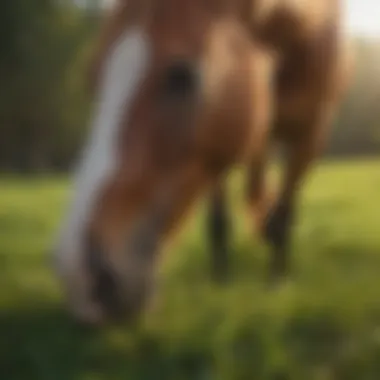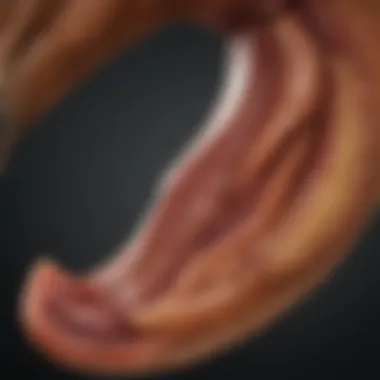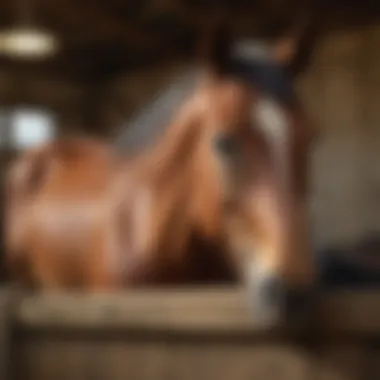Nutritional Supplements for Preventing Colic in Horses


Intro
Understanding the role of nutrition in equine health is not something to gloss over. Colic, a term that sends chills down the spines of horse owners everywhere, can wreak havoc on an otherwise healthy horse's life. This article looks at how nutritional strategies, particularly the use of supplements, can help keep colic at bay. By breaking down essential concepts and sharing practical insights, the aim is to equip horse owners with knowledge to make informed dietary choices for their beloved animals.
Key Concepts and Terminology
Definition of Terms
Before diving into the nitty-gritty of nutritional supplements, it's essential to break down some key terms that will be used throughout this discussion.
- Colic: This refers to a condition that presents itself as severe abdominal pain in horses. It’s not a single disease but rather a symptom of various underlying problems.
- Nutritional Supplements: These are products added to a horse's diet that provide nutrients not readily available in the feed. Common supplements include vitamins, minerals, and digestive aids.
- Digestive Health: This term encompasses everything related to how well a horse's gastrointestinal tract functions. A healthy gut is fundamental to overall horse well-being.
Overview of Relevant Practices
When it comes to reducing the risk of colic, education on nutritional management is invaluable. Horse feed should not just consist of hay and grain. Understanding the horse's digestive system is crucial; the horse is designed to graze continuously, and sudden changes in diet can upset the balance.
Here are some key practices to keep in mind:
- Regular feeding schedules maintain stable digestive functions.
- High-fiber diets support gut health, while grains should be introduced gradually.
- Providing clean, fresh water at all times is essential.
Horse owners should also be aware that certain breeds or ages might have specific needs, necessitating tailored nutritional strategies.
Current Trends and Innovations
Latest Research and Developments
The equine veterinary field is continually evolving, with new studies emerging around nutritional strategies for colic prevention. Recent research indicates that certain probiotics might help balance gut flora, potentially reducing the incidence of digestive upset.
Moreover, some nutritional supplements, like Omega-3 fatty acids found in flaxseed, are gaining attention for their anti-inflammatory properties, which may be advantageous in promoting digestive health.
Emerging Technologies and Tools
As technology advances, tools such as mobile apps that help track a horse's diet and health metrics are becoming available. These apps provide owners with valuable insights into feeding practices and can even send alerts if unusual behavior indicative of colic is detected.
Practical Applications
Step-by-Step Guides
Implementing optimal nutritional strategies to prevent colic involves a few straightforward steps:
- Assess Current Diet: Analyze your horse's current feed to identify gaps in their nutrition.
- Choose Quality Supplements: Consult a veterinarian or equine nutritionist to select suitable supplements tailored to your horse's needs.
- Gradually Implement Changes: Any dietary adjustments should be made sloowly over 7-10 days to prevent digestive upset.
- Monitor Response: Keep a close watch on your horse’s behavior, stool consistency, and overall health.
- Adjust as Necessary: Be prepared to tweak the diet based on your observations and professional advice.
Troubleshooting Common Issues
When trying to implement nutritional strategies, you may face a few hurdles. Here are some potential issues and tips on how to tackle them:
- Reluctance to Eat Supplements: Mix supplements into feed or use palatable flavors to encourage consumption.
- Digestive Upset after Changes: If your horse exhibits signs of distress, revert to the previous diet and consult a vet.
"Prompt attention to diet changes can help fend off colic before it strikes—don’t let your horse suffer for lack of nutritional knowledge."
By keeping these strategies and concepts in mind, horse owners can greatly improve their understanding of how supplements can play a role in preventing colic, ultimately enhancing equine health and well-being.
Understanding Colic in Horses
Colic is shrouded in complexities that can lead to significant distress in our equine companions. Understanding colic in horses is paramount given its prevalence and potentially dire consequences if left untreated. In this section, we’ll delve into the definition of colic, its symptoms, underlying causes, and the key role of preventive care.
Defining Colic and Its Symptoms
Colic is, broadly speaking, an umbrella term for abdominal pain in horses, but it can manifest in various ways that go beyond a mere tummy ache. Symptoms range from mild discomfort to severe distress, and identifying them early is crucial. Common indicators include:
- Restlessness: Horses may try to lie down excessively, roll, or kick at their bellies.
- Depression: A lack of interest in food or interaction can signal trouble.
- Increased Heart Rate: An elevated heart rate can suggest that something isn’t right internally.
- Sweating: Notable sweating, especially around the flanks, can also indicate discomfort or pain.
Recognizing these signs early on can make the difference between a manageable issue and a veterinary emergency.
Causes of Colic in Horses
The causes of colic are as varied as the symptoms. A veritable minefield of potential triggers exists, warranting a closer look at the dietary and environmental factors affecting equine health. Some of the most common causes include:
- Dietary Changes: Sudden shifts in diet, like switching from hay to grain, can upset a horse's digestive system.
- Dehydration: Insufficient water intake can lead to impactions in the intestines.
- Parasites: Unseen hitchhikers can wreak havoc on digestive health.
- Stress: Changes in environment, such as moving stables or new companions, can provoke anxiety leading to colic episodes.


Addressing these root causes, or steering clear of them when possible, is essential in managing equine well-being.
The Importance of Preventive Care
Preventive care is akin to a shield against colic, serving as an essential part of equine management. A proactive approach can mitigate risks significantly. Here are a few strategies:
- Routine Checks: Regular veterinary check-ups help catch any early signs of trouble.
- Proper Nutrition: Ensuring a balanced diet that caters to the specific needs of each horse plays a pivotal role in their digestive health.
- Hydration Awareness: Maintaining access to fresh and clean water is critical to prevent dehydration and associated issues.
- Gradual Changes: Any changes to diet or routine should be implemented gradually to give the digestive system time to adapt.
"The path to preventing colic lies not just in treatment, but in preemptive measures that lay the groundwork for long-term horse health."
In summary, understanding colic's symptoms, causes, and preventive care strategies empowers horse owners to make informed decisions. By prioritizing equine health and welfare, one can significantly reduce the risk of colic and related complications.
Nutritional Foundations for Equine Health
Understanding the nutritional needs of horses is akin to knowing the roots of a tree; it is foundational and critical for overall health. In the quest to prevent colic, a thorough grasp of these nutritional foundations can pave the way for happier, healthier equine companions. When foucus is on the appropriate nutrients, horses can thrive instead of just survive.
Proper nutrition helps mitigate several health issues, colic included. It’s not merely about filling the trough with feed; it’s about selecting the right ingredients and proportions that cater to each horse’s specific needs. This foundation includes but isn't limited to, understanding the role of fibers, proteins, carbohydrates, vitamins, and minerals in a horse’s diet.
Here are some specific elements and considerations surrounding Nutritional Foundations for Equine Health:
- Balanced Diet: A combination of forage, grains, and supplements must be balanced thoughtfully to fulfill a horse's metabolic and energy requirements. For example, high-quality hay ensures adequate fiber intake, while grains provide necessary calories.
- Individual Needs: Each horse is unique with differing factors such as age, work intensity, and health status requiring personalized nutrition plans. What works for one might be detrimental for another.
- Digestive Health: A well-rounded diet supports the horse's digestive system, impacting everything from energy levels to susceptibility to colic.
By emphasizing the importance of foundation nutrients and their transformative effects on equine health, horse caretakers can stave off many health problems.
Understanding Equine Digestive Anatomy
A horse's digestive system is uniquely designed to process a diet rich in fiber. This trait is vital because it dictates how a horse should be fed and the types of supplements to consider. The equine digestive system consists of:
- Mouth: Starting point where the chewing process begins. Saliva helps break down food and aids digestion.
- Esophagus: A muscular tube that transports food to the stomach. Important to remember is that horses cannot vomit, so any blockage can lead to serious health issues.
- Stomach: This organ is relatively small from a horse’s body size perspective. Food passes quickly through here, underscoring the importance of providing smaller, frequent meals instead of large servings.
- Small Intestine: The site of nutrient absorption; about 70 feet long, where most carbohydrates and proteins are processed.
- Cecum and Large Intestine: Fermentation occurs here allowing horses to extract energy from fibrous feeds.
Each component plays a role in processing the foods they consume. Failing to understand this anatomy could lead horse owners astray when making feeding decisions that might contribute to digestive disturbances, including colic.
Role of Fiber in Maintaining Digestive Harmony
Fiber is the unsung hero in equine nutrition. It’s essential for ensuring that the digestive system operates smoothly. Horses are not like other animals that can quickly digest their food. Instead, they depend on continuous fiber intake to keep the system flowing.
Here’s why fiber matters so much:
- Promotes Gut Health: Fiber acts as a natural regulator, ensuring stool consistency and preventing constipation, a precursor to colic.
- Encourages Chewing and Salivation: Chewing stimulates saliva production, which is important for neutralizing stomach acid and aiding digestion.
- Provides Energy: Fermentable fiber in forages converts to volatile fatty acids in the cecum, serving as an energy source without spiking blood sugar levels.
- Maintains Gut Flora Stability: Healthy fiber intake supports the bacterial population in the gut, which is critical for nutrient absorption and overall gut function.
In summary, fiber serves as the backbone in a horse's diet. It’s not just about filling them up; it’s about ensuring their digestive processes are comfortable and efficient. High-fiber diets reduce risks associated with colic significantly, providing horse owners a simple strategy to enhance their animal's health.
Key Nutritional Supplements to Consider
When it comes to protecting our equine companions from colic, nutritional supplements play a crucial role. They can help strengthen the horse’s digestive system and prevent disturbances that may lead to colic symptoms. The right balance of nutrients can make a significant difference in overall equine health. Let’s look into the various supplements that stand out in the prevention of colic.
Probiotics: Enhancing Gut Flora
Types of Probiotics
Probiotics are live microorganisms that provide health benefits when consumed in adequate amounts. Different types of probiotics exist, each with unique characteristics and benefits for horses. Some commonly recognized strains include Lactobacillus acidophilus and Bifidobacterium bifidum. These strains help maintain the balance of gut flora, contributing to improved digestion and nutrient absorption. Their popularity stems from their effectiveness in enhancing gut health and preventing gut-related issues, including colic. A unique feature of these probiotics is their ability to survive the gastric environment and reach the intestines intact, offering advantages in promoting digestive health.
Mechanism of Action
The mechanisms through which probiotics operate are fascinating. Essentially, these beneficial bacteria compete with harmful microorganisms for nutrients and attachment sites in the gut. This competitive inhibition helps maintain a balance of flora, a vital aspect of preventing digestive upset. Furthermore, they can produce substances that lower the pH of the gut, creating an environment less favorable for pathogens. This unique action makes probiotics particularly valuable in a preventative strategy against colic in horses, offering a natural method to enhance gut health.
Effective Dosage
Determining the right dosage of probiotics is essential for maximizing their benefits. Generally, a daily administration of around 1 to 2 billion CFU (colony-forming units) per horse is effective in promoting gut health. However, it is crucial to note that individual responses may vary based on factors such as age, health status, and the specific product used. Consistency in dosing is a key characteristic of effective supplementation. This ensures that the gut flora remains balanced over time, which ultimately contributes to colic prevention.
Prebiotics: Supporting Digestive Health
Types of Prebiotics
Prebiotics are non-digestible carbohydrates that stimulate the growth of beneficial bacteria in the gut. Common types include fructooligosaccharides (FOS) and mannanoligosaccharides (MOS). These compounds can feed the good bacteria, thus enhancing their growth and activity. The unique feature of prebiotics is that they selectively promote beneficial microorganisms while suppressing harmful bacteria, making them a potent ally in digestive health strategies. Their increasing recognition in equine nutrition highlights their beneficial role in maintaining a healthy digestive environment, crucial for colic prevention.
Synergistic Effects with Probiotics
The relationship between prebiotics and probiotics can be described as synergistic. When used together, they have a compounded effect on gut health. Prebiotics serve as food for probiotics, which enhances the efficacy of both. This partnership promotes a balanced microbiome, essential for proper digestion and disease prevention. Understanding this dynamic further solidifies the importance of incorporating both into a horse's diet for comprehensive digestive care.


Recommended Sources
When selecting prebiotic sources for your horse, options such as beet pulp, wheat bran, and soy hulls can be beneficial. Each of these sources not only aids in digestion but also adds fiber, supporting overall gut motility. While they are relatively easy to integrate into regular feeding routines, it’s important to monitor the horse’s response to any new supplement incorporation. This careful observation enables one to tailor diets to meet the specific needs of each horse efficiently.
Electrolyte Supplements: Preventing Dehydration
Importance of Electrolyte Balance
Maintaining proper electrolyte balance is critical in equine health. Electrolytes such as sodium, potassium, and chloride play various roles in bodily functions, including muscle function and hydration. For horses, particularly those under heavy work or during hot weather, losing these essential minerals can lead to dehydration and, in turn, a risk of colic. Keeping a close watch on electrolyte levels aids in enhancing performance and lowering stringent health risks, reinforcing why they are a key supplement in any colic prevention strategy.
Signs of Electrolyte Imbalance
Being able to identify signs of electrolyte imbalance can be lifesaving. Common symptoms include lethargy, decreased appetite, and abnormal sweating patterns. A horse may also exhibit muscle cramping or weakness. Recognizing these symptoms early can allow for swift intervention, which may prevent the onset of more serious issues like colic. Awareness of electrolyte health should be encouraged among horse owners as a fundamental aspect of preventative care.
Choosing the Right Electrolyte Supplement
There are numerous electrolyte supplements available on the market, but selecting the right one can be daunting. A good electrolyte supplement should contain a balanced blend of sodium, potassium, and chloride, alongside other vital trace minerals. Quality products will typically specify their component content and be palatable for horses. Opting for a reputable brand ensures not just the effectiveness of the supplement, but also the safety for equine use. An informed choice here can go a long way in preventing colic while sustaining physical wellbeing.
The Role of Minerals and Vitamins
In the intricate sphere of equine nutrition, minerals and vitamins can't be overlooked when discussing strategies to mitigate colic. These micronutrients contribute not only to overall wellness but also play pivotal roles in digestive health. Deficiencies or imbalances in these essential nutrients can lead to serious health issues, including colic, a common and often distressing condition in horses. Therefore, understanding how vitamins and minerals support digestive function is essential for any horse owner aiming to promote their equine partner’s well-being.
Calcium and Magnesium: Balancing Digestive Function
Calcium and magnesium are two key minerals that work hand-in-hand to maintain digestive equilibrium in horses. Calcium is crucial for muscle function, nerve transmission, and maintaining strong bones. It interacts with other minerals, ensuring smooth muscle contractions within the digestive tract. An adequate level of calcium promotes normal peristalsis, the wave-like muscle contractions that move feed through the gut.
Magnesium, on the other hand, serves as a natural relaxant for muscle tissues. Insufficient magnesium can lead to excessive muscle tension, resulting in gastrointestinal disturbances. Moreover, these two minerals can help maintain an optimal acid-base balance in the horse's body, critical for overall health.
Common sources of calcium include:
- Alfalfa hay
- Ground limestone
For magnesium, consider:
- Green leafy forages
- Magnesium oxide supplements
"Providing a proper balance of calcium and magnesium in your horse's diet is like ensuring the right tune in an orchestra. Each note has its role, and together they create a harmonious performance."
Vitamin E: Antioxidant Properties and Muscle Health
Vitamin E acts as a powerful antioxidant, protecting cells from damage caused by free radicals. In the context of equine health, antioxidant protection is particularly important for muscle health. Studies indicate that vitamin E can reduce oxidative stress during exercise, a common scenario in performance horses.
Moreover, vitamin E contributes to maintaining proper nerve function, which directly affects digestive health. A well-functioning nervous system ensures appropriate muscle contractions in the digestive tract, preventing issues that could lead to colic.
Sources of vitamin E worth considering are:
- Fresh pasture grass
- Specific vitamin E supplements designed for equines
B Vitamins: Supporting Energy Metabolism
B Vitamins are often referred to as the powerhouse group of vitamins because they play integral roles in energy metabolism. They assist in the breakdown of carbohydrates, fats, and proteins into usable energy, essential for a horse’s day-to-day activities and overall function.
For instance, Vitamin B1 (thiamine) is particularly crucial for nerve function, while Vitamin B12 supports cellular energy production. An adequate supply of B vitamins helps maintain robust digestive health and enhances the horse's ability to cope with physical stress.
Sources of B Vitamins include:
- High-quality grains and forages
- Commercial supplements designed to boost B vitamin levels
By ensuring your horse receives ample vitamins and minerals, you are laying the groundwork for a strong digestive system and overall good health. This holistic approach not only reduces the risk of colic but also supports the horse in achieving peak performance and vibrant well-being.
Integrating Supplements into Feeding Routines
Incorporating nutritional supplements into a horse’s feeding regimen is a pivotal strategy in tackling colic risks. The right supplements can greatly enhance the overall digestive health of equines. When considering supplements, it's crucial to think about how they mesh with the existing diet. A well-rounded approach is not just about throwing in tens of different products. It's a thought-out integration, timing, and balance that count.
Assessing Individual Nutritional Needs
Aging Horses and Their Requirements
Older horses often bring a distinct set of needs to the table. As horses age, their digestion can become less efficient, making it imperative to pay special attention to their diets. Aging horses generally require higher quality feeds that ensure nutrient absorption is optimal. This evolving need makes close monitoring essential. They might face dental issues which affect how they chew and digest their food, creating a potential challenge in maintaining a balanced diet.


Aging equines may benefit from specialized supplements, like joint support formulas or enhanced calorie packs that cater to their changing bodies. The key characteristic here is adaptability – their changing nutritional needs signal horse owners to be more proactive than reactive in their feeding strategies. However, the uniqueness also means greater care should be taken when introducing new supplements, as older horses can be more sensitive.
Workload and Nutritional Assessment
Each horse has a unique workload which can change frequently. Those in consistent training require different nutrients compared to those in light work. This aspect of nutritional assessment is not just beneficial; it's essential for a horse’s performance and health. By correctly gauging a horse's workload, owners can tailor their supplements to avoid deficiencies or surpluses.
The standout feature here is that dietary adjustments based on workload can lead to noticeable improvements in both physical condition and temperamental behavior. However, this requires diligent monitoring and flexibility to make necessary changes along the way, which some might find cumbersome.
Consulting with Veterinary Professionals
Another critical piece of the puzzle is consulting veterinary professionals. They are equipped with the knowledge and insights to personalize feeding routines and supplement choices. An equine vet can identify deficiencies or health concerns that might not be readily apparent to the owners. They can also guide you in navigating the seemingly overwhelming world of supplements – those different brands, formulas, and misconceptions.
Regular check-ups can facilitate preventive strategies which not only ensure a horse's immediate health but help ward off future issues, including colic.
Monitoring Responses and Adjusting Plans
Just as horses aren't static, neither should their diets be. After integrating supplements, monitoring their effects becomes necessary. Observing changes in behavior, coat condition, and general well-being can provide clues. If a horse seems off—or not as perky—perhaps a particular supplement isn't sitting well with it. Adapting the nutrition plan should not be viewed as a hassle but rather as part of a comprehensive health strategy.
Regular evaluations will lead to a more harmonious feeding routine tailored to what suits the horse best. This ongoing process ultimately champions digestive health, reducing the likelihood of colic, and fosters an environment where the horse can thrive.
Potential Side Effects and Considerations
When discussing nutritional supplements for equine health, especially regarding colic prevention, it’s crucial to recognize potential side effects and considerations that come with their use. This section unpacks a critical aspect of responsible horsemanship—ensuring that what is meant to help does not inadvertently cause harm.
The landscape of equine nutrition is evolving. Supplements play an essential role in bolstering the overall health of horses, but not every supplement is a one-size-fits-all solution. Horse owners must remain vigilant regarding possible adverse reactions that may arise from introducing new supplements into a horse's diet. Often, these reactions can be subtle, such as a change in behavior, or significant, like gastrointestinal distress. Understanding these possible complications enables horse owners to act promptly and protect their equine companions.
Understanding Possible Reactions to Supplements
Certain horses can be sensitive to specific ingredients found in nutritional supplements, ranging from herbal components to synthetic additives. For instance, a horse might experience colic symptoms like abdominal pain after ingesting a particular probiotic or prebiotic. It’s important to note that while probiotics can enhance gut flora, they may also lead to an imbalance if the horse reacts negatively.
Common reactions may include:
- Gastrointestinal upset: This can manifest as bloating, diarrhea, or even colicky behavior.
- Allergic reactions: Although rare, some horses may develop skin irritations or respiratory issues after ingesting certain compounds.
- Behavioral changes: A horse that suddenly becomes agitated or lethargic after the introduction of a supplement might be experiencing a negative reaction.
Always start with lower dosages when trying a new supplement of any kind. Gradual introduction allows you to monitor your horse’s reaction carefully, providing insight into whether the product suits them or if adjustments need to be made.\
Avoiding Over-Supplementation
While the desire to keep a horse healthy through supplements is commendable, over-supplementation can lead to adverse effects that counteract the intended benefits. Too many nutrients, particularly minerals and vitamins, might result in their accumulation to toxic levels in the horse's body, leading to severe health issues. For example, excess calcium and phosphorus can impact bone health and lead to conditions like hypercalcemia.
Here are a few tips to prevent over-supplementation:
- Evaluate diet first: Ensure that the horse's baseline diet is balanced and meets nutritional requirements before adding supplements.
- Consult with a professional: Regularly engage with a veterinarian or an equine nutritionist who can help tailor supplementation to your horse's specific needs.
- Keep track: Maintain a log of all supplements given, noting any changes in the horse’s health or behavior to identify any patterns connected to specific products.
Effective supplementation, particularly for conditions like colic, is about quality over quantity. It's essential to remember that supplements should fit neatly into a comprehensive nutritional strategy rather than overwhelm the horse's dietary regimen. The bottom line: moderation, keen observation, and professional guidance are your best allies in safeguarding your horse's health through supplementary nutrition.
"Ignoring subtle signs of over-supplementation can lead to bigger troubles down the road. Always err on the cautious side for your horse’s well-being."
Taking the steps to understand the potential side effects of supplements and the risks of over-supplementation will ultimately contribute to a healthier, more balanced feeding regimen that advocates for long-term equine health.
The End: A Holistic Approach to Colic Prevention
Understanding colic in horses is not merely about addressing the symptoms or conditions when they arise; it's about adopting a comprehensive strategy that fosters overall equine health. Colic, being a multifaceted issue influenced by many factors, necessitates a holistic approach that includes nutritional insights, routine care, and active monitoring. Effective management revolves around recognizing the subtle signs that horses might show before full-blown colic sets in. This vigilance allows for timely intervention, which can make all the difference.
Several core elements play a role in the holistic prevention of colic:
- Nutritional strategies: The right balance of vitamins, minerals, and fiber aids digestive efficiency and keeps the gut flora in check. Tailoring diets that are high in quality forage, supplemented with the correct nutrients, can significantly reduce colic risk.
- Regular veterinary consultations: Part of a holistic approach includes ongoing discussions with veterinarians who can help track changes in the horse's health. These professionals provide insights based on their expertise that can guide owners in making better choices for their horses.
- Routine management practices: Establishing a consistent feeding schedule and regularly checking for signs of distress can foster an environment where early detection of potential colic is easier.
"A horse's health is not a journey but a lifestyle. A well-managed routine is crucial in keeping colic at bay."
Integrating all these components creates a fortified framework for horse care that prioritizes prevention over reaction. This strategy not only aids in reducing colic cases but also enhances the overall well-being, energy, and performance of the horse.
Summarizing Effective Supplements
The correct use of supplements is integral to minimizing colic risk. Effective supplements such as probiotics and electrolytes serve unique purposes, enhancing the digestive process and preventing dehydration. For instance, probiotics can help establish beneficial gut flora, facilitating improved digestion and nutrient absorption. Similarly, maintaining electrolyte balance is vital, particularly during hotter months or strenuous activities. Insufficient electrolyte levels can lead to dehydration, which is a known risk factor for colic.
In choosing effective supplements, consider:
- Quality of ingredients: Ensure that what you are giving your horse is of high quality and designed for equine health.
- Dosage guidelines: Adhering to recommended dosages will prevent the risk of over-supplementation, which could potentially lead to digestive issues.
The Importance of Routine Management
Implementing routine management practices cannot be understated. A well-structured feeding regime, alongside a consistent schedule for exercise and downtime, lays the groundwork for digestive health. Horses thrive on predictability. By feeding at the same times and in similar environments, they tend to experience less stress, reducing the likelihood of colic.
Additionally, monitoring any shifts in a horse's behavior or appetite becomes easier when there's a consistent structure in place. Regular check-ins can lead to the early identification of issues before they escalate. Owners should always consult with veterinarians to adapt management practices to meet the evolving needs of their horses, especially as factors like age or workload change.







